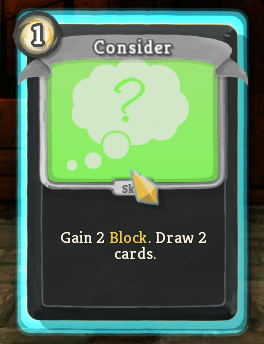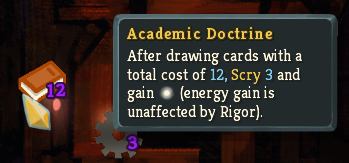The First Of Many
So far, I’ve created my first few cards and tested that they function as intended, as well as implemented a few new features that will play a significant role in the gameplay of my mod. Before I get to that, though, I’ll give a quick rundown of my overall plans, copying liberally from the Google Doc where I did my brainstorming.
My Plan
In my mod, I aim to create a new character for Slay the Spire: the Psychologist. They came to the spire because they wanted to do a graduate thesis on its otherworldly inhabitants, and their mechanics will play into various tropes and elements of psychology. When I set out, I planned for their primary mechanics to include the following:
- Feedback is a new debuff that damages a creature whenever they attack. Feedback will decay over time, halving at the end of each round. Feedback functions similarly to Thorns.

- Conditioning is a new colorless card similar to a Shiv, which grants a small amount of Feedback and a small amount of temporary Strength. It can be applied to oneself to give a boost to damage in exchange for a small amount of health or applied to enemies as pseudo-Caltrops. Abilities that can be used both on enemies and allies depending on the situation have always intrigued me regardless of the game, which is why I’m hoping to implement this into my mod.
- Doctrines, a new type of orb with no passive effects, are automatically evoked in certain situations.
- Therapeutic Doctrine, granting Temporary HP after playing 10 Attacks.
- Practical Doctrine, granting Vigor after playing 10 Skills.
- Academic Doctrine, drawing cards after playing 20 cards of any type.
- Rigor, a mechanic similar to Focus, applies to Doctrines instead of Orbs, reducing the number of cards needed to trigger a Doctrine.
These mechanics will lend themselves to a variety of archetypes. I aim to have each mechanic fit into multiple archetypes so that it’s possible to pivot one’s plan if things aren’t working out. The archetypes I have planned are as follows:
- Colorless Cards: Similar to the Watcher’s “card generation” build, this will focus on adding cards to the deck during combat. However, instead of explicitly caring about these generated cards, colorless cards will instead be the focus of the archetype, allowing for more interplay with other aspects of the game.
- Feedback: Two builds centered on the Feedback debuff and the Conditioning cards.
- Self-Conditioning: An aggressive build that asks the player to use Feedback cards on themself to get discounted effects and more damage. Vigor, Strength, and similar effects are crucial to this build.
- Enemy-Conditioning: A defensive deck that gives a lot of Feedback to enemies and then stacks up Block. Temporary HP can help this build out by acting like the Barricade Power.
- Broken Block: Cards that care about when the player’s Block is broken. Feedback helps with this by allowing the player a source of self-damage, and Temporary HP helps with this by allowing an attack to break Block but not cause the player to lose health.
- Card Draw: This build will care about having many cards in hand and also the action of drawing cards. To help this, the Insight card1a card introduced for the Watcher which draws two cards for no cost, then Exhausts will feature prominently, fitting into the Psychologist’s flavor as an academic and also helping out the Colorless Cards build. Because card draw will be plentiful, I’ll have to make sure not to let energy generation become too easy to prevent the trivial assembly of infinite combos.2A common strategy among high-level Slay the Spire players is to use high amounts of card draw to play the same cards indefinitely.
- Doctrines: This build aims to stack up as much Rigor as possible to gain the various benefits of each Doctrine with ease. This is probably the least defined build, but it is also very versatile and value-oriented. Temporary HP and Vigor are both potent benefits, and drawing cards is a generic but handy capability that should help the build become more consistent.
The Story So Far
Hopefully, you can see how the different mechanics and builds interlink and play together. If things go well, this foundation will allow me to construct a clean and cohesive new character. With that out of the way, though, here’s a brief rundown of what I’ve managed to create so far:
- Ten new cards
- Seven are expected to be in the final product, one of which has art (please keep in mind I am a programmer and not a graphic designer).
- Three for use during debugging.
- Both new powers: Feedback and Rigor.
- All three Doctrines were implemented as a new type of orb.
However, not everything went smoothly. Once I began testing my new mechanics, I immediately realized I would need to make a few changes. As soon as Doctrines moved from an idea to being an actual mechanic I could interact with, I realized how unenjoyable they felt. My initial numbers were much too high. Furthermore, I discovered an issue in the case where the player manages to create an infinite combo. In such a situation, they would potentially have to play hundreds of cards before gaining significant benefits from their Doctrines, causing boring gameplay that stalls out fights.

The first thing I did was lower the requirements for Doctrines. But this created a new problem: Doctrines were too easy to trigger with just a few cheap cards (such as Conditioning). As a result, I switched from having Doctrines require playing cards to having them require spending energy. Here are the updated requirements and payoffs:
- Therapeutic Doctrine: Grants 9 Temporary HP after spending 3 energy on Attacks.
- Practical Doctrine: Grants 9 Vigor after spending 3 energy on Skills.
- Academic Doctrine: Grants energy after drawing cards costing a total of 12.
You’ll notice I also changed the Academic Doctrine from being a card-draw enabler to a card-draw payoff. This change allows the associated strategy to convert card draw into other beneficial effects more quickly.
This change to Doctrines also necessitated a respective change to Rigor as well. If Rigor still reduced the requirements to trigger Doctrines, that would mean that only a few stacks of Rigor would make Therapeutic and Practical Doctrines instantly activate. To fix this, I changed Rigor to be more like Focus, increasing the effects of Doctrines rather than reducing their requirements.
This change, in turn, necessitated further tweaking. I couldn’t let Rigor affect the energy gain of the Academic Doctrine without that being unbalanced, but I also didn’t want to go the route of the Plasma Orb and make Rigor not affect Academic Doctrines at all. As such, I decided to make the effect of Academic Doctrines be to both gain energy and additionally Scry, with only the Scry being affected by Rigor. This will allow Rigor to more cohesively fit in with all Doctrine-based strategies and provide more consistency to enable the extra energy to be used more effectively.

The current (and hopefully final) version of Doctrines are as follows:
- Therapeutic Doctrine: Grants 9 Temporary HP after spending 3 energy on Attacks.
- Practical Doctrine: Grants 9 Vigor after spending 3 energy on Skills.
- Academic Doctrine: Grants Scry 3 and energy after drawing cards costing a total of 12 energy.
Going Forward
A lot of the groundwork is now in place, and the next stretch of development will be creating and debugging cards. Unless I run into any major issues, my next update probably won’t be until I’ve got a significant portion of the cards created. At that point, I won’t just be testing mechanics or individual cards but the feel of the character as a whole, which I think warrants a new devlog. My next article will detail my next stage of testing along with any foibles related to individual card designs that I think are interesting.
